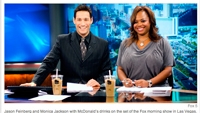Product placement invades news sets

Anchors on KVVU, the Fox affiliate in Las Vegas, sit with cups of McDonald’s iced coffee on their desks during the news-and-lifestyle portion of their morning show. They rarely touch the cups.
Executives at the station, one of 12 owned by Meredith Corporation, say the six-month paid promotion is meant to shore up advertising revenue and, as they told the news staff, will not influence content.
“There was a healthy dose of skepticism, and I’m pleased there was — it means they’re being journalists,” Adam P. Bradshaw, news director of KVVU, told the “New York Times.” The product placement was first reported last week in “The Las Vegas Sun.”
The arrangement, the “New York Times” reported, raises questions about potential conflicts between the intended message and news content. The ad agency that arranged the promotion said the coffee cups would most likely be whisked away if KVVU chooses to report a negative story about McDonald’s. Neither the agency nor KVVU would reveal the price of the six-month deal.
Other stations owned by Meredith — including WFSB, the CBS affiliate in Hartford, CN, and WGCL, the CBS affiliate in Atlanta — are also accepting product placements on their morning shows.
Journalists and media watchdogs, angered by the continuing erosion of news values, were outraged by the arrangement. The issue of product placements is under scrutiny at the FCC, which is considering tighter rules for how sponsorships on TV shows are disclosed.
In 2005, the FCC said television broadcasters must disclose when they use certain video news releases provided by corporations. Last June, the Writers Guild of America West sent a letter to the commission supporting real-time disclosure of product placement and asking for a ban on video news releases on local broadcast television.
Get the TV Tech Newsletter
The professional video industry's #1 source for news, trends and product and tech information. Sign up below.
Herbert Jack Rotfeld, a professor of marketing at Auburn University, told the “Times” that product placement deals on news shows could backfire for both sides. “In the end, they just make the audiences even more skeptical of everything,” he said.
